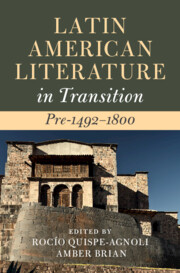Book contents
- Latin American Literature in Transition Pre-1492–1800
- Latin American Literature in Transition
- Latin American Literature in Transition Pre-1492–1800
- Copyright page
- Dedication
- Contents
- Figures
- Contributors
- Acknowledgments
- Introduction Dwelling in Transitions
- Part I Land, Space, Territory
- Part II Body
- Part III Belief Systems
- Part IV Literacies
- Part V Languages
- Chapter 18 Technologies of Communication in Transition: Indigenous Orality and Writing in Colonial Mexico
- Chapter 19 A Baroque Arte: Horacio Carochi and the Tradition of Nahuatl Grammars
- Chapter 20 Acquiring a Voice: The Plebeians Speak in Early Colonial Río de la Plata
- Chapter 21 Knowledge in Transition: Rethinking the Science of Sameness in Sor Juana Inés de la Cruz’s New Spain
- Part VI Identities
- Index
- References
Chapter 20 - Acquiring a Voice: The Plebeians Speak in Early Colonial Río de la Plata
from Part V - Languages
Published online by Cambridge University Press: 25 November 2022
- Latin American Literature in Transition Pre-1492–1800
- Latin American Literature in Transition
- Latin American Literature in Transition Pre-1492–1800
- Copyright page
- Dedication
- Contents
- Figures
- Contributors
- Acknowledgments
- Introduction Dwelling in Transitions
- Part I Land, Space, Territory
- Part II Body
- Part III Belief Systems
- Part IV Literacies
- Part V Languages
- Chapter 18 Technologies of Communication in Transition: Indigenous Orality and Writing in Colonial Mexico
- Chapter 19 A Baroque Arte: Horacio Carochi and the Tradition of Nahuatl Grammars
- Chapter 20 Acquiring a Voice: The Plebeians Speak in Early Colonial Río de la Plata
- Chapter 21 Knowledge in Transition: Rethinking the Science of Sameness in Sor Juana Inés de la Cruz’s New Spain
- Part VI Identities
- Index
- References
Summary
The Río de la Plata, the location itself and the journeys towards that destination, hit by failure and discouragement, helped build hostile discourse about the land but also gave rise to a series of scenes about what has not been found before. Therefore, new ways of envisaging this land came to light, as well as the denunciations of Europeans’ excesses. This chapter studies the legal environment where stories of hostility and degradation reveal the forgotten voice of the plebs. The conquest and colonization of the Rio de la Plata then functions not only as the creator of a discourse of deception but also as a scenario that enables the rising of the marginalized voice of seamen, among others.
Keywords
- Type
- Chapter
- Information
- Latin American Literature in Transition Pre-1492–1800 , pp. 301 - 314Publisher: Cambridge University PressPrint publication year: 2022

